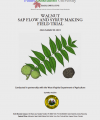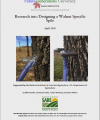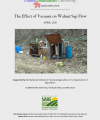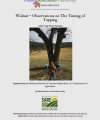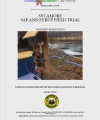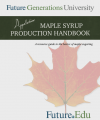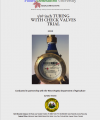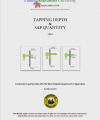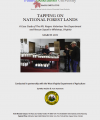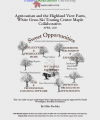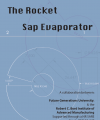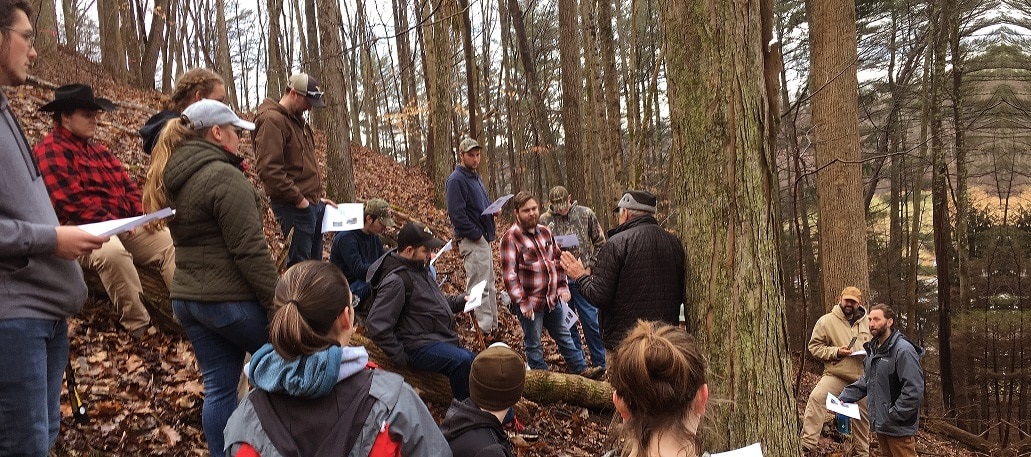
Free downloadable resources
Questions, need more information? We are here to help. Please use this form to let us know your needs.
Walnut
Walnut Sap Flow and Syrup Making Field Trial, Jan-March 2019 by Mike Rechlin:
This report summarizes the experiences of a major field trial in walnut tapping at the Dry Fork Maple site conducted by Future Generations under a WVDA research contract. It also integrates work done by two producers in WV and the Virginia Tech Catawba Farm in VA. Download
Research into Designing a Walnut Specific Spile, April 2020, by Mike Rechlin, Christoph Herby, “Chip” Matheny, and Karen Milnes:
This report details an initiative conducted through the 2019-2020 sap flow season to design and test a spile specific to walnut trees. Drawing off of findings from the 2019 “Walnut Sap Flow and Syrup Making Field Trial” the longer, more highly tapered spile design aimed to counteract problems identified in the previous study. This research was conducted with support from the Northeast Sustainable Agriculture Research and Education program. Download
The Effect of Vacuum on Walnut Sap Flow, April 2020, by Mike Rechlin, Kate Fotos, Christoph Herby, and Mat Cabral:
This report details an initial study on the effects of vacuum on walnut sap production. With low vacuum, averaging 8-inches Hg, sap flow doubled (p<0.05). Late in the season, the research team connected a larger pump, which pulled 20-inches Hg. Though not enough runs were conducted to determine a statistical difference, in initial observations, walnut trees produced over double the sap under higher vacuum. This research was conducted with support from the Northeast Sustainable Agriculture Research and Education program. Download
Walnut – Observations on The Timing of Tapping, 2020 Sap Flow Season by Mike Rechlin and Christoph Herby:
This report discusses an initial study on the proper time to tap walnut trees. Walnut trees are anatomically different from maple trees, indicating that they may have a different sap flow season. In the initial study, the data shows that walnut trees run concurren to maples. However, a single tap placed in late April produced an equal amount of sap in half a day as a tap did on average over the whole maple sap season. This research was conducted with support from the Northeast Sustainable Agriculture Research and Education program. Download
Sycamore
Sycamore Sap and Syrup Field Trial, January-March 2019 by Mike Rechlin:
This report summarizes an initial field trial and study of sycamore sap collection and syrup production. Sycamore trees, as a diffuse porous hardwood, in theory would produce a sweet sap that could be made into syrup. In this study, a diaphragm pump on 3/16ths-inch sap line was attached to 25 spouts on 18 trees, collecting syrup from January 23rd to February 13th. This study was conducted with support from the WVDA through a Specialty Crop Block Grant. Download
Maple
Appalachian Maple Syrup Production Handbook:
A resource guide to the basics of maple sugaring. Download
West Virginia Sugar Operation Review Preparedness Manual & Regulatory Guidelines, By Britney Hervey Farris:
This manual is a step by step guideline for making your syrup making facility is ready for the production of food products. Download
West Virginia Sugar Operation Review Preparedness Manual & Regulatory Guidelines-Appendix:
Appendix for the above handbook and manual. Download
3/16-inch Tubing with Check Valves Trial, 2018 by Mike Rechlin:
Using two parallel sap lines, the effectiveness of check-valve (CV) spouts was tested. During the testing period, there was a warm spell with temperatures reaching above 70 degrees and not reaching below freezing. After the warm spell the CV spouts should have much higher sap production than the non-CV spouts, ending the season with the CV spouts producing 37% more sap than the normal spouts. This study was conducted with support from the WVDA through a Specialty Crop Block Grant. Download
Tapping Depth & Sap Quantity, 2019 by Mike Rechlin:
This study discusses the effects of driving taps deeper into the drilled tap hole. By driving the tap an extra ¾-inch into the drilled hole, a producer reduces their sap output by 60%. Which means, for every extra hammer hit past the taps natural seating position, the producer decreases their output by 20%. This study was conducted with support from the WVDA through a Specialty Crop Block Grant. Download
Group and Operation Studies
Tapping on National Forest Lands: A Case Study of The Mt. Rogers Volunteer Fire Department and Rescue Squad in Whitetop, Virginia, March 2019 by Mike Rechlin and Tom Hammett:
This case study discusses the sugaring operation run by the Mt. Rodgers Volunteer Fire Department and Rescue Squad. Exploring the operation from permit acquisition to its future plans, this study sheds light on a unique maple syrup operation. This study was conducted with support from the WVDA through a Specialty Crop Block Grant and the VADA through a Specialty Crop Block Grant. Download
Agritourism and the Highland View White Grass Ski Touring Center Collaborative, April 2020 by Mike Rechlin:
This case study details the partnership between Highland View Farm, Canaan Valley Maple, and White Grass Ski Touring Center. This partnership is an interesting mix of historical maple production, current production practices, and tourism, resulting in a unique agritourism site in the heart of Canaan Valley. This case was part of the Sweet Opportunities Project supported by the generosity of the Claude Worthington Benedum Foundation. Download
Rocket Stove Sap Evaporator, 2020 by Mike Rechlin and Arley Carpenter:
This stove is designed to provide a fast and vigorous boil with near complete combustion resulting in efficient wood use. Based on rocket stove principles, this sap evaporator was also designed to be inexpensive to build and capable of being fabricated by a local welder. The Rocket sap evaporator is meant for “backyard” syrup producers. Developed by West Virginia’s Future Generations University in collaboration with the Robert C. Byrd Institute of Advanced Manufacturing, these plans and instructions will get you “on the launch pad” and ready for the delicious and fun activity of making maple syrup. Download
Didn’t see what you are looking for? Have feedback? Please fill out this comment form.

